Being a Data Quality Analyst: Careers in Data Quality
If you’re considering the career opportunities available in data quality, data quality analyst is one of the more obvious titles to look at. But don’t be misled by the data… analyst part; there’s a lot more to the job than you might expect.
Here’s a deep dive into the role of a data quality analyst, and how you can tell if it’s right for you.
Qualifications
What kind of background do you need for data quality analysis? Here’s a rundown.
Education
Like most data-adjacent jobs, data quality analyst positions generally require a college degree; some companies specifically look for a B.S. But you don’t need a specific degree to have a chance.
If you have work experience in data analysis or a data-analysis-adjacent position, highlight that first on your resume, no matter what degree you have.
But if you’re a fresh graduate or changing fields, you might need to feature your degree more prominently, and that’s where knowing how to frame it will come in handy.
-
If your major was something like data science, computer science, statistics, engineering, or mathematics...
Congratulations: there will be no questions.
OK, not really. But if you’re fresh out of school, no one is going to raise an eyebrow about your seeking an entry-level data quality analyst position.
If you have one of these degrees, but have been working in a field that isn’t well-known for needing “hard” skills, you’ll need to position yourself as a data quality analyst candidate by making a convincing argument—and ideally, demonstration—that your math and programming skills are still sharp.
If it’s been a few years, check out what the “it” tools for cutting-edge analytics are, since they can turn over quickly.
The exception to this is if you’re moving from a less-technical role in the same industry as the data the job is looking at—like moving from insurance adjuster to data quality analyst at an insurance company. Your real-world subject-matter expertise might make hiring managers more willing to give you a longer runway for restoring any rusty quantitative skills.
-
With other math-heavy majors like physics, biology, chemistry, economics, pre-med, and psychology…
Most hiring managers will recognize that you have a pretty solid background in math and computer science, and if you don’t already have the finer skills required by a data quality analyst, you’re well-positioned to learn them.
If you happen to be coming from a recent research experience that involved a lot of modeling analysis, you’re probably in an even stronger place than a candidate with a statistics or data science degree but no practical experience.
-
But degrees in subjects like English, political science, communication, pre-law, finance, and business...
Are also very relevant to data quality analyst positions. (You probably didn’t think that’s how that sentence would end.)
Being successful in these subjects requires being able to make persuasive arguments, deploy critical thinking, and communicate extremely clearly. These are all essential to a data quality program’s success, but not all hiring managers will recognize it. You’ll likely have a tougher time pitching your candidacy.
Most obviously, the mathematical and programming skills that data quality analysis needs aren’t usually a part of these curriculums. You’ll need to have taken some classes, alongside your major or later as continuing education, or to have self-studied.
If you did self-study, proof of your skills—like contributions to an open source project—are going to be key for demonstrating that you know what you say you do.
Fresh out of school with one of these majors, it will be extremely difficult to land a data quality analyst position. The exception is if you double-majored or minored in a math-intensive major, or had a compelling side project; it’ll still be hard, but you at least have a chance.
But, if you’ve worked in a non-analyst role in almost any field and have acquired the needed technical skills, at least some data quality analyst roles will see this as better experience than having spent your whole career in data analysis.
This is because, as discussed later, data quality analysts need to have a lot of understanding of, interaction with, and cooperation with the business side of… well, the business. If you yourself have been on the other side, you’ll have a level of expertise there that can’t be taught.
Skills
As a data quality analyst, you’ll need a combination of hard and soft skills. Don’t be misled by most of the words being data analyst; the soft skills aren’t just lip service confined to the job posting.
The hard (as in quantitative, not as in difficult) skills are the more obvious ones:
-
You’ll need to be very comfortable with math, particularly statistics, for the actual “analytics” part. That includes the ability to incorporate the real-world context of the data you’re working with, not just blindly crunching numbers.
You’ll have to know not just what and how for different models and distributions, but when they’re relevant… and when they’re not.
-
In most companies, you’ll be responsible for getting the data to quality-analyze out of the company’s systems. So you’ll need skills like writing SQL queries that will help you get exactly the data you need—no more and no less.
-
Scripting so that you don’t have to do everything by hand will be key. Python, Excel, SQL again, and SAS are all big players.
-
General technical proficiency is also indispensable. At the time this was written, the major open source tools used for data quality analysis include the Pandas Python library, R, TensorFlow Data Validation, Great Expectations, and Deequ; major proprietary tools include Alteryx, SPSS, Informatica, Excel again, SQL a third time, and SAP. Big players in visualization include Tableau and PowerBI.
Data quality analysts also often work closely with data governance, which introduces a whole new suite of software you might need to interact with, like Collibra, IDQ, Talend, and Alation.
Any one job might use all or some of these; if you’re not prepared to learn at least one on-the-job, you’ll really limit your options. Plus, the favored programs can change over time. If you keep expanding your skillset to include the new favorites, you’ll be better set up for job mobility and a longer career.
The soft (as in qualitative, not as in easy) skills are less obvious, but they’re extremely important in a successful data quality program:
-
You’ll need to be able to build relationships. There are some technical positions where you can do good work without having to really interact with many of your coworkers; this isn’t one of them.
When you do root cause analysis, you’ll need information from the everyday users of the systems you’re working with. Sometimes, they might feel that the information isn’t flattering to them—if they’re employing a workaround or shortcut that runs against official policy, for instance.
Without a good rapport, you’ll struggle to get the real story. But you can get a lot of insight if you build a relationship where they feel you’re here to help them, and don’t just see them as an obstacle to better data.
And then, once you have a solution, you can recommend until the cows come home, but if:
-
The system’s users don’t buy into your suggested process changes and refuse to carry them out...
-
The business won’t invest in the additional technology or people you think are necessary...
-
You can’t convince IT to implement your changes anytime this decade...
...the data’s quality won’t improve. Depending on the scenario, this leads more or less directly to subpar outcomes for the business. That will be laid at your feet.
-
-
Related to the above: persuasive communication will be a key skill. Hard numbers can do a lot of heavy lifting for some people, but they aren’t all things to everyone.
If you need to convince an already-busy person to add more to their plate, or to move their team to a new process when from their perspective the old one was just fine, thank you—you’re going to need to make a convincing case for why they should make the effort.
This goes twice as much if you’re working at a large company with data that crosses departmental silos. Specifically, if the people who need to make the change aren’t the people who will see benefits from the results of the change.
-
Critical—and creative—thinking are both important skills for root cause analysis. This is especially the case when the quality problem stems from a people-process issue, rather than a technical mishap.
Creative thinking also comes in useful when you need to solve a people-process issue. You need to be able to put yourselves in the shoes of the people involved in the process, and then figure out a solution that is effective, achievable, relatively painless, and financially feasible. “Front line data entry tries harder” isn’t going to cut it.
-
Some awareness of visual aesthetics will be helpful. You’ll have to create reports and presentations that people all over the company, and at many levels, will see.
You want your readers to get your conclusions and recommendations, yes, but you also want that to happen quickly, with minimal effort on their part. That means you use a clear and visually appealing format.
Nice-looking presentations and reports will help you build both credibility (your work looks professional) and increase people’s willingness to even try to absorb your results (your work is easy to process). You won’t get those benefits by inflicting Powerpoints that are entirely walls of text on people.
That said, you don’t have to be an artistic genius. If you can select a built-in theme from Powerpoint*, recognize which of the slides below has a better density of content, and then apply that knowledge to your slideshow or report document, you’re in a decent place.
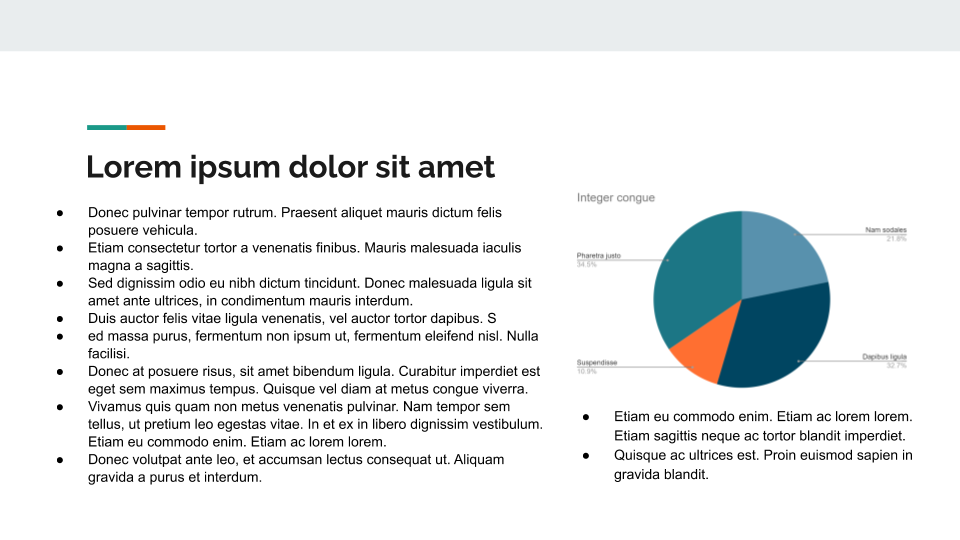
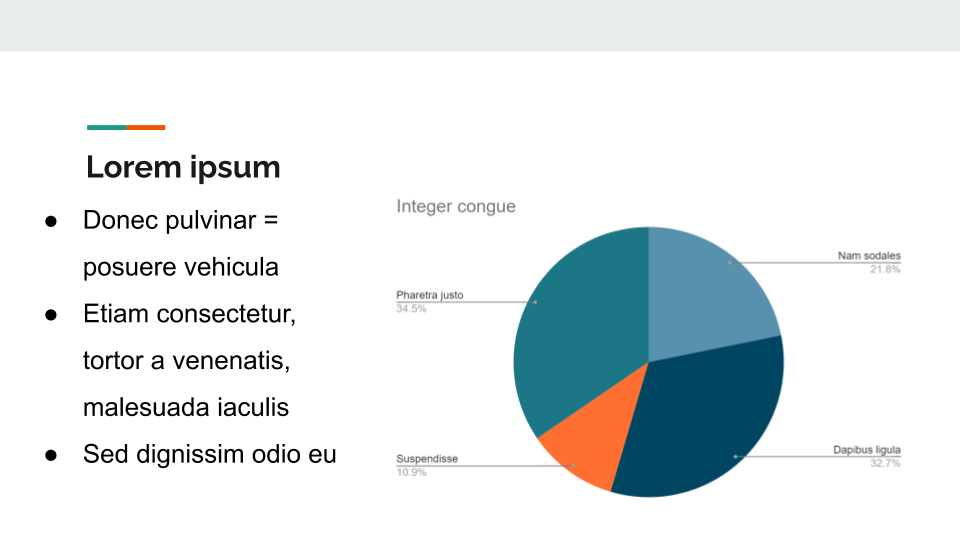 * Or Google Slides or Canva or Word or whatever you’re using.
* Or Google Slides or Canva or Word or whatever you’re using.
Personality
Becoming a data quality analyst isn’t the right path for everyone, even if your education and skills seem to line up—and if it isn’t for you, no shame in that! It’s better to know from the start if your preferred work style is compatible with the role.
To start, data quality analysts need to be very flexible. Check out these phrases from some real DQ analyst job postings:
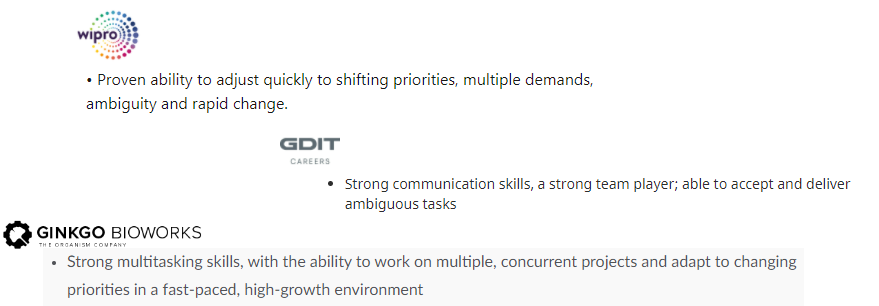
OK, those phrases aren’t uncommon in job postings of all sorts. But that doesn’t make them less relevant for the data quality analyst role. “Data quality” is a new enough field that even long-term programs can suddenly find themselves needing a change.
If you strongly prefer to have a well-defined, long-term plan with few deviations and tightly-scoped work with clear boundaries, you probably won’t enjoy being a data quality analyst much.
On the other hand, if you like the variety that comes with moving targets, or appreciate the opportunity to define your own path that comes with not-very-well-defined goals, you can find those in data quality analyst roles.
To be a data quality analyst, you need to be comfortable working with people. Remember the importance of relationship-building: you’re going to be more successful if you’re proactive at forming those relationships, rather than doing only the absolute minimum.
You don’t have to be the most extroverted person to ever extrovert. But not all communication is best done over email, so if you’ll do anything to avoid getting on the phone or setting up a meeting, maybe this isn’t the right path for you.
As a data quality analyst, you’ll have to present results to groups, speak up unsolicited when you have relevant information, and advocate for yourself and your projects to get resources.
That might mean contradicting or correcting people who are senior to you in terms of the company hierarchy and/or tenure at the company. If that’s something you struggle with, be prepared to overcome it.
Advocating for resources can put you in direct competition with colleagues who want those resources for their projects. Whether you win or lose that competition, you need to maintain a working relationship with those people. Gloating and/or being a sore loser will be very unhelpful.
A tendency toward thoroughness is extremely valuable for data quality analysts. If a company is investing in their data to the point of hiring a data quality analyst, that data is now a valuable asset. And if it’s a valuable asset, you can’t be careless with it.
That means when you say you’re solving a problem, you need to solve it. If an edge case of the supposedly-solved issue pops up a week later, that’s going to look bad for you.
If you’re the kind of person who gets personal satisfaction from dotting every i and crossing every t, that expectation for deep-diving is a great fit. But if you’re happiest when you get the ball rolling then move on to the next thing, data quality analyst isn’t a good match.
You’ll also need to be comfortable, and ideally enjoy, explaining things. As a data quality analyst, you’ll be in the middle of a lot of different groups and working with people whose experience working with data is really variable.
You need to make sure all those people understand your conclusions, buy in, and execute the data quality solutions you develop. If you’re a patient teacher and comfortable thinking of different ways to explain the same subject, you’ll get to exercise those skills for sure. If you don’t like it when you have to repeat things, reformulate explanations, or when other people ask questions that are obvious to you, you’ll find this part of the role really frustrating.
Sometimes you’ll be on the other end of that scenario: an expert in a different area will be telling you something that you don’t really grasp right away. You need to be willing to ask questions and admit you don’t know or understand something if you want to extract a successful outcome from the situation.
Finally, as a data quality analyst, you’ll be working in a field that is very much still under development. There are established frameworks for some situations and software vendors that have implemented a lot of functionality, but best practices are constantly being updated, and new techniques are always being invented.
Your personal experience will vary widely depending on how well-established your company’s data quality program is. You might find you have colleagues who have seen it (almost) all before as you work in a well-established framework. Or you might find yourself in the (metaphorical) wilderness, troubleshooting problems and creating procedures from an absolutely blank slate.
If you strongly prefer one or the other, look for roles accordingly.
Job Duties
We’ve covered many of the job duties of a data quality analyst in the course of the discussion above, but here’s a summary.
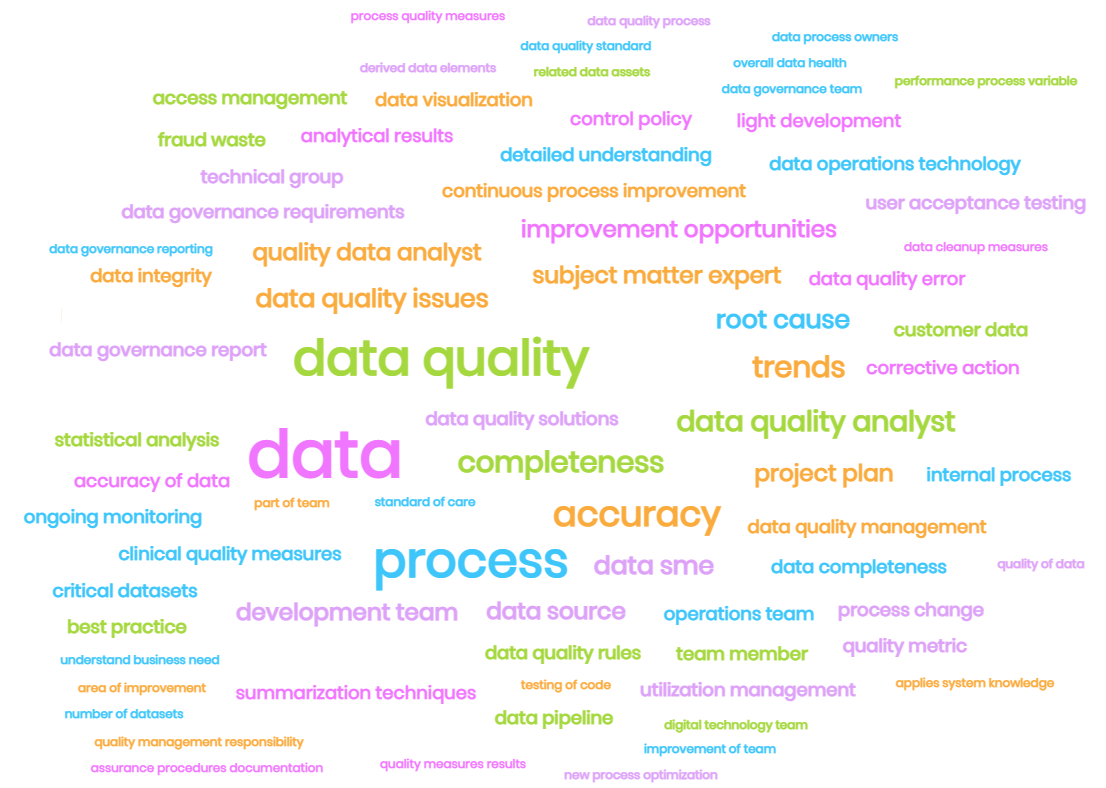 Word cloud generated using MonkeyLearn.
Word cloud generated using MonkeyLearn.
Type of Job
The most common type of data quality analyst role is permanent, full-time, and on-site.
However, there are some organizations that have partly or fully remote data quality analyst roles. These may start to become more common now that Covid-19 has forcibly introduced work-from-home into many companies.
While as of 2021 full-time is by far the most common job type for data quality analysts, there are some part-time positions. Again, as the data quality field grows, more part-time positions may become available as smaller organizations that can’t support a full-time data quality analyst still find the need for one, or as larger organizations look to supplement their existing teams.
Most posted openings for data quality analysts are for permanent employees, but there are contract and temporary positions available. These are usually associated with consulting firms, looking for a data quality analyst with experience in a specific industry to round out their in-house team for a specific project.
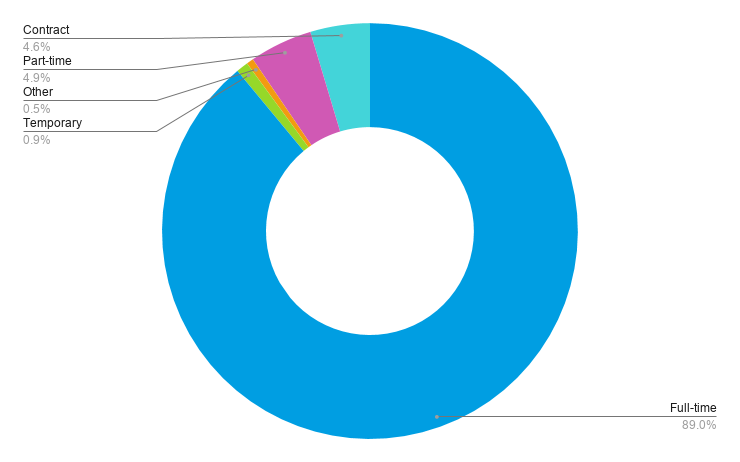 Data compiled from LinkedIn, Indeed.com, and Glassdoor January 2021
Data compiled from LinkedIn, Indeed.com, and Glassdoor January 2021
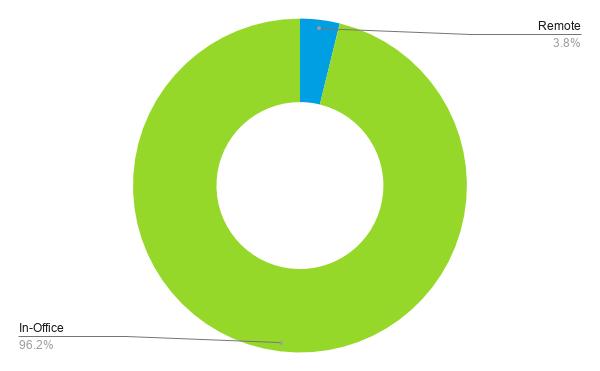 Data compiled from LinkedIn, Indeed.com, and Glassdoor January 2021
Data compiled from LinkedIn, Indeed.com, and Glassdoor January 2021
So, while most data quality analyst roles point to a typical office experience, there are some openings for people who are looking for shorter-term or remote work in the role.
Consulting-associated opportunities might be especially appealing if you’re a late-career professional who’s not quite ready to retire, but not looking for years-long commitment. If any of your work history is in the same industry as the project, but a non-data-quality position, this could position you as a very competitive candidate for these very specialized projects as long as you have the requisite technical skills.
Data Quality Analyst Salary
According to January 2021 data from Indeed.com, the national average salary for a “data quality analyst”-titled role is $62,453, with salaries ranging from $43K at the low end to $95K at the high end.
Comparing the eleven cities below, most fall in line with this national range, the exception being San Francisco and its famously high cost of living.
If you’re looking for data quality analyst salary information in a location where Indeed (or your research site of choice) doesn’t have much data for that title, try checking related job titles—discussed next—to get a better idea of what to expect.
Related Job Titles
If you’re searching for a data quality analyst job, keep in mind that there’s no universal definition of “data quality analyst.” It’s a relatively new role, so if an accepted definition does start to coalesce, it’ll probably still be a few years from now.
Today, roles that are data quality analyst roles, as described in this article, might be listed as business analyst, data analyst, IT analyst, data engineer, quality assurance analyst, and other similar titles.
You’ll note that these titles are heavily associated with the “hard skills” aspects of data quality analysis. You’re very unlikely to find data quality analyst jobs listed with more communications-oriented titles.
Industries
There’s potential to be a data quality analyst in almost any industry that uses data… which is all of them.
Industries which are “traditionally” known for heavy data usage include finance, telecommunications, health, and government.
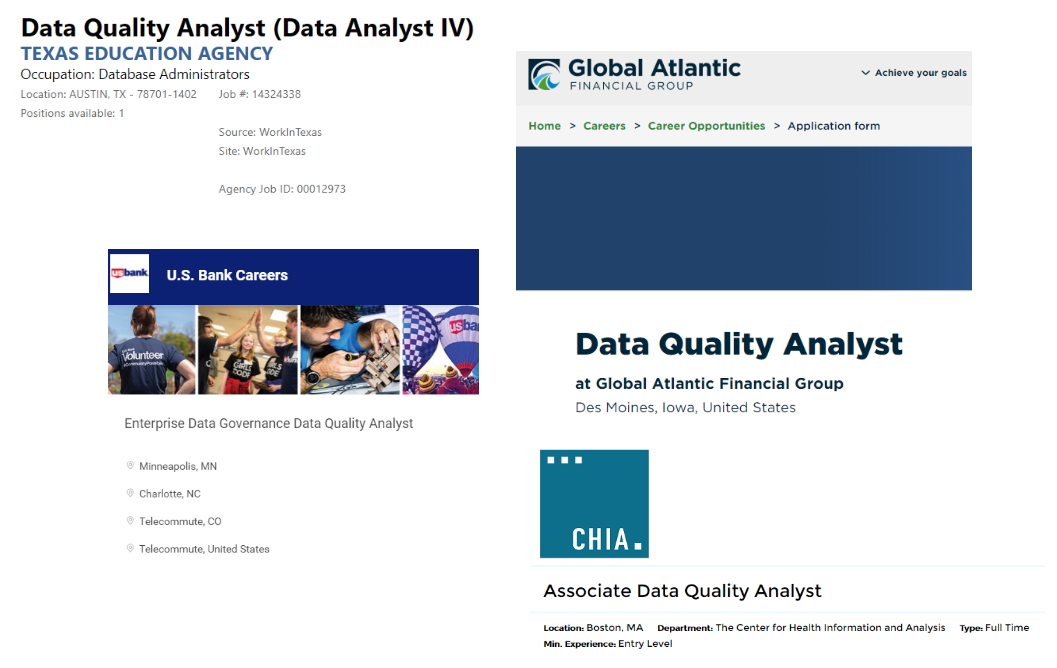
These days, virtually all companies recognize the importance of data; it’s a question of how ready they are to invest in it with positions like data quality analyst.
Some “newcomer” industries include entertainment (especially streaming services, which live and die by subscriber engagement data), manufacturing, and food—particularly as investment in smart and AI-driven products picks up.
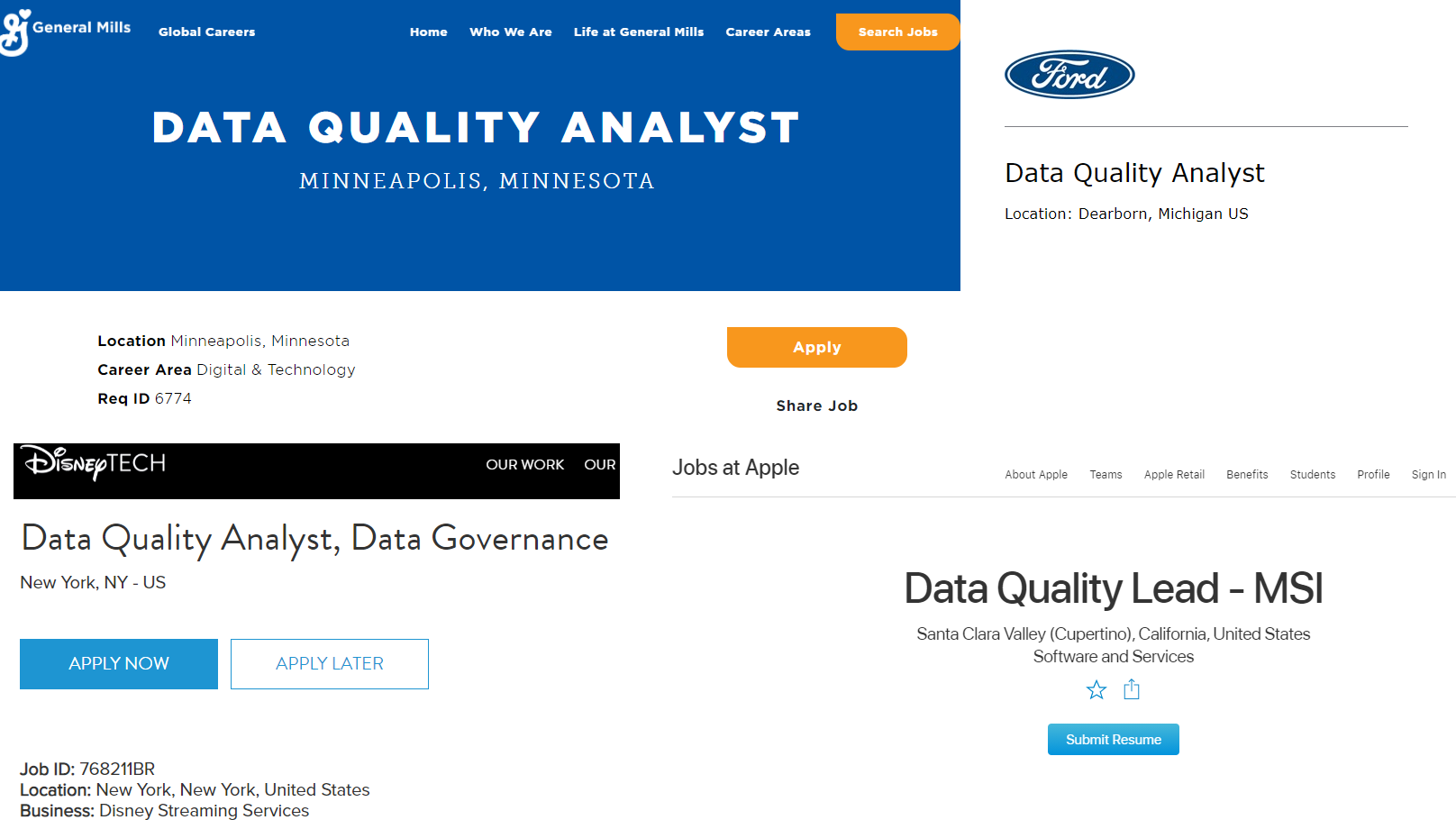
When looking at roles, take into account what kind of overall intensity you want, which is influenced both by industry and by company size. Consider whether you thrive under pressure, or if you do your best work when you have some room to breathe.
Future Outlook
The data quality field is only going to grow. The market's growth over the next few years is projected to be 17.4%1 annually, reaching a global market size of $8.47 billion.2
As part of that, there'll be increasing demand for data quality analysts.
As technology, AI, and automation get better and smarter at handling some of the more basic tasks that currently fall to data quality analysts, the role will start to focus on those higher-level parts that need human judgement, business knowledge, and input from different parts of the organization.
Given these factors, a data analyst role will put you in a strong position for finding continued work as long as you stay flexible and continue to grow your skills. Particularly, focus on growing your skills around understanding the business in context of the world at large, making complex decisions, and building relationships—things that can’t be easily automated away.
1https://www.researchandmarkets.com/reports/4804565/data-quality-tools-global-market-trajectory-and
2https://www.researchandmarkets.com/reports/4804565/data-quality-tools-global-market-trajectory-and
To download a copy of this as a pdf, click here.

